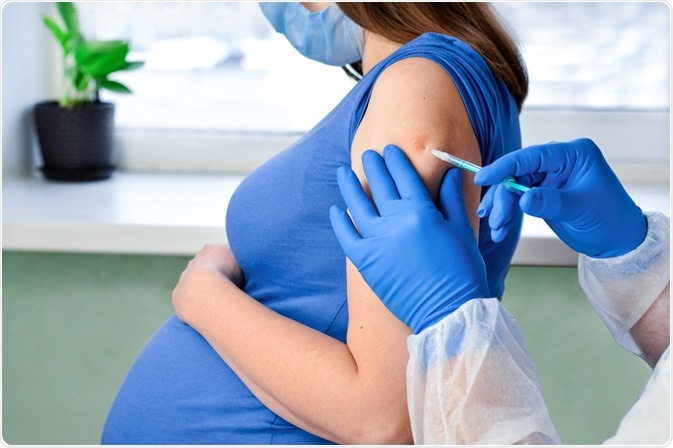Some vaccinations are recommended to women trying to get pregnant and those who are already pregnant. The antibodies introduced into the mother’s immune system via these vaccines can cross the placenta and also give their babies a level of immunity from serious illnesses.
However, while certain vaccinations are beneficial and recommended for pregnant women, others are not suitable and are advised against as a precaution.

Pregnant Woman getting a Vaccine. Image Credit: Marina Demidiuk/Shutterstock.com
Here we discuss which vaccinations are recommended for pregnant women and which are to be avoided. In addition, we discuss the safety of getting the COVID-19 vaccination while pregnant.
Which vaccines are recommended for pregnant women?
The Centers for Disease Control and Prevention (CDC) recommend that women who are pregnant during flu season should get the flu vaccine. It is most beneficial for women to receive their vaccine at the beginning of flu season, although there are still benefits to getting the vaccination at any point during flu season.
There is a wide body of scientific evidence to support that flu vaccinations are safe for pregnant women to take. In addition, women vaccinated during pregnancy may pass on immunity to their baby, protecting them from flu-related complications shortly after birth.
The CDC also recommends that pregnant women receive the Tdap vaccine (to protect against whooping cough) at any point during their pregnancy, although research suggests it is most beneficial to get the Tdap vaccine between weeks 27 and 36 of pregnancy.
Women who get the Tdap vaccine can protect both themselves and their baby from whooping cough, which can be fatal. The CDC recommends that even if women have already received a whooping cough vaccine they should get it again during pregnancy.
Which vaccines should pregnant women not get?
Several vaccines are not recommended during pregnancy, mostly because they are live attenuated vaccines that pose a greater risk of side effects. The human papillomavirus (HPV) vaccine, measles mumps, and rubella (MMR) vaccine, live influenza vaccine (nasal flu vaccine), varicella (chickenpox) vaccine advised against.
MMR vaccines are live attenuated vaccines and are advised against as a precautionary measure, although there is no evidence that the MMR vaccine can cause harm to the fetus. There is some concern that the HPV vaccine can cause harm to the fetus, with it being suggested that it may increase the risk of spontaneous miscarriage. However, recent research has not found evidence to support this link. As a precaution, the HPV virus is not recommended for pregnant women.
Some travel vaccines, such as yellow fever, typhoid fever, and Japanese encephalitis are also advised against unless the healthcare professional deems that the benefits of receiving the vaccination outweigh the risks.
Is it safe for pregnant women to be vaccinated against COVID-19?
Many questions are surrounding the safety of the COVID-19 vaccinations, particularly for pregnant women. Data has shown that pregnant women are at an elevated risk of suffering severe illness from COVID-19 in comparison to those who are not pregnant. Data suggests that pregnant women are at a greater risk of being admitted into intensive care, requiring ventilation, and dying from COVID-19 than the general population. COVID-19 infection has also been linked with adverse pregnancy outcomes, such as preterm birth.
Due to the elevated risk to mother and baby that COVID-19 causes, vaccination is important to ensuring the health and survival of both parent and child. Therefore, vaccinations must be suitable for pregnant women. Currently, all authorized COVID-19 claim that they can be administered to pregnant and breastfeeding women.
However, collecting vital clinical trial data to prove a vaccine’s safety in specific populations takes time to collect and analyze, especially in terms of assessing potential long-term effects. While experts believe that severe adverse effects for the mother or baby are unlikely, clinical trials are currently underway to support their safety.
Numerous clinical trials are currently in progress to investigate how COVID-19 vaccines work in pregnant women. The results of these trials will hopefully give greater confidence in the safety of the vaccines in this population. Also, vaccine manufacturers are collecting data from clinical trials involving those who received the vaccine and became pregnant after.
At the moment, data from animal studies is available that demonstrates the safety of administering the Moderna, Pfizer-BioNTech, and J&J/Janssen vaccine in animals before and during pregnancy. However, animal models are not always effective predictors of how a vaccine will behave in humans.
Due to the increased risk that COVID-19 presents to pregnant women, it can be argued that the benefits of getting the vaccine outweigh potential adverse effects given that the current data is promising regarding the safety of the vaccine in pregnant women. However, getting a vaccine is always an individual choice.
References:
- Allotey, J., Stallings, E., Bonet, M., Yap, M., Chatterjee, S., Kew, T., Debenham, L., Llavall, A., Dixit, A., Zhou, D., Balaji, R., Lee, S., Qiu, X., Yuan, M., Coomar, D., Sheikh, J., Lawson, H., Ansari, K., van Wely, M., van Leeuwen, E., Kostova, E., Kunst, H., Khalil, A., Tiberi, S., Brizuela, V., Broutet, N., Kara, E., Kim, C., Thorson, A., Escuriet, R., Oladapo, O., Mofenson, L., Zamora, J. and Thangaratinam, S., 2020. Clinical manifestations, risk factors, and maternal and perinatal outcomes of coronavirus disease 2019 in pregnancy: living systematic review and meta-analysis. BMJ, p.m3320. https://www.bmj.com/content/370/bmj.m3320
- BMJ, 2021. Update to living systematic review on covid-19 in pregnancy. p.n615. https://www.bmj.com/content/372/bmj.n615
- Information about COVID-19 Vaccines for People who Are Pregnant or Breastfeeding. CDC. Available at: https://www.cdc.gov/coronavirus/2019-ncov/vaccines/recommendations/pregnancy.html
- Vaccines During and After Pregnancy. CDC. Available at: https://www.cdc.gov/vaccines/pregnancy/vacc-during-after.html
- Vaccines During Pregnancy FAQs. CDC. Available at: https://www.cdc.gov/vaccinesafety/concerns/vaccines-during-pregnancy.html
Further Reading
Last Updated: Jan 17, 2022